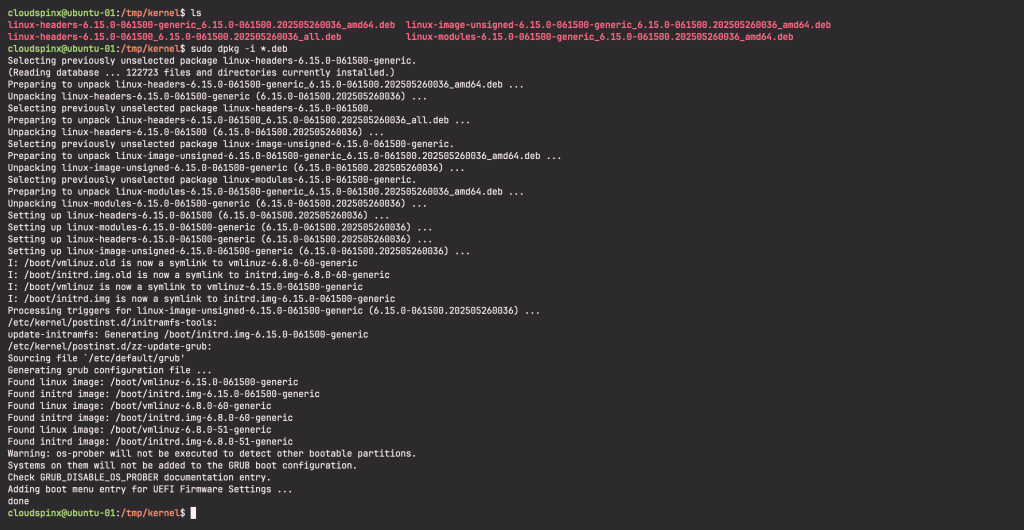The kernel of an operating system (OS) is the program that allows hardware and software to communicate with one another. The Linux kernel functions as an interpreter, enabling interaction between programs and the user interface (UI) with the hardware, with the aid of device drivers.
🔑 Unlock the complete Ubuntu Desktop learning journey by purchasing our best selling ebook: The Ultimate Ubuntu Desktop Handbook.
This guide will demonstrate how you can install Linux Kernel 6.15 on your Ubuntu 24.04|22.04.
Major Roles of the Kernel
Here are the major roles of Kernel in Operating System:
- Manage RAM memory to ensure that all programs and processes are able to operate.
- With Kernel, processor time, which is used by ongoing processes is managed.
- Control who has access to and how the computer’s various peripherals are used.
Default Kernel Version in Ubuntu 24.04|22.04
To check the default kernel version in Linux OS, we use uname -r command. Different Linux Distros have different Kernel version.
On Ubuntu 24.04 we get the default kernel version as follows:
$ uname -r
6.8.0-51-genericSame case to Ubuntu 22.04, the default kernel version is as follows:
$ uname -r
5.15.0-141-genericLinux Kernel 6.15 Release
The Linux Kernel 6.15, officially released on May 25, 2025, includes a wide range of important improvements across various areas, with a major focus on the areas of performance, security, hardware support, and filesystem functionalities. At this juncture, it is useful to have a closer look at some of the main features that this impressive new version has to offer us.
Linux Kernel 6.15 New Changes
The following are the major changes following the release of Linux Kernel 6.15:
- Latency profiling in the perf subsystem is made available so that system performance can be profiled and optimised by the developers in a more effective manner.
- Enhanced Memory Management: Introducing a new defrag_mode sysctl to reduce fragmentation and modifications in the buddy allocator to make allocations more efficient.
- Btrfs Changes: Btrfs supports faster and real-time Zstd compression levels -15 until -1 with improved performance but decreased compression ratio. It also defaults back to buffered writes in the case where direct I/O is attempted on files with checksums, decreasing virtual machine checksum mismatching.
- exFAT Performance Enhancement: Removing files on exFAT filesystems is dramatically faster, especially if using the “discard” mounting option. Removing an 80 GB file, for example, takes about 1.6 seconds compared to over 4 minutes.
fwctlSubsystem: The fwctl subsystem introduces firmware management standardization to facilitate announced Remote Procedure Calls (RPCs) to firmware. This is necessary to allow secure device firmware configuration, update, and debugging from user space.- NOVA, a rust-based version of the Nouveau driver, an extremely early development stub of NOVA, is underway. In an early stage of development, it’s intended to provide improved support to newer GSP-based GPUs.
- Extended Device Support: Linux version 6.15 brings support for newer devices including Apple Touch Bar on Intel MacBook Pros, Samsung GalaxyBook functionality, Sony PlayStation 5 controllers, and Intel’s Killer E5000 Ethernet, to name a few.
- Python 3.9+ Requirement: To be compatible with current tools, the kernel code and the documentation are now Python 3.9 compliant.
Install Linux Kernel 6.15 on Ubuntu 24.04|22.04
Following the steps below, you will be able to install Linux Kernel 6.15 on Ubuntu 24.04 | 22.04.
Requirements
The following are required for complete and successful installation:
- Ubuntu 24.04(Noble Numbat) or Ubuntu 22.04(Jammy Jellyfish).
- A user account with root access.
Step 1 – System Update
By running the following command on Ubuntu 24.04|22.04, you may ensure that all existing packages are up to date:
sudo apt update && sudo apt upgradeStep 2 – Download Linux Kernel 6.15 package
Download the Linux Kernel 6.15 packages for your specific architecture into a directory in the /tmp directory:
mkdir /tmp/kernel
cd /tmp/kernelamd64 Architecture:
wget https://kernel.ubuntu.com/mainline/v6.15/amd64/linux-headers-6.15.0-061500-generic_6.15.0-061500.202505260036_amd64.deb
wget https://kernel.ubuntu.com/mainline/v6.15/amd64/linux-headers-6.15.0-061500_6.15.0-061500.202505260036_all.deb
wget https://kernel.ubuntu.com/mainline/v6.15/amd64/linux-image-unsigned-6.15.0-061500-generic_6.15.0-061500.202505260036_amd64.deb
wget https://kernel.ubuntu.com/mainline/v6.15/amd64/linux-modules-6.15.0-061500-generic_6.15.0-061500.202505260036_amd64.debarm64 Architecture:
wget https://kernel.ubuntu.com/mainline/v6.15/arm64/linux-headers-6.15.0-061500-generic-64k_6.15.0-061500.202505260036_arm64.deb
wget https://kernel.ubuntu.com/mainline/v6.15/arm64/linux-headers-6.15.0-061500-generic_6.15.0-061500.202505260036_arm64.deb
wget https://kernel.ubuntu.com/mainline/v6.15/arm64/linux-image-unsigned-6.15.0-061500-generic-64k_6.15.0-061500.202505260036_arm64.deb
wget https://kernel.ubuntu.com/mainline/v6.15/arm64/linux-image-unsigned-6.15.0-061500-generic_6.15.0-061500.202505260036_arm64.deb
wget https://kernel.ubuntu.com/mainline/v6.15/arm64/linux-modules-6.15.0-061500-generic-64k_6.15.0-061500.202505260036_arm64.deb
wget https://kernel.ubuntu.com/mainline/v6.15/arm64/linux-modules-6.15.0-061500-generic_6.15.0-061500.202505260036_arm64.debarmhf Architecure:
wget https://kernel.ubuntu.com/mainline/v6.15/armhf/linux-headers-6.15.0-061500-generic_6.15.0-061500.202505260036_armhf.deb
wget https://kernel.ubuntu.com/mainline/v6.15/armhf/linux-image-6.15.0-061500-generic_6.15.0-061500.202505260036_armhf.deb
wget https://kernel.ubuntu.com/mainline/v6.15/armhf/linux-modules-6.15.0-061500-generic_6.15.0-061500.202505260036_armhf.debppc64el Architecure:
wget https://kernel.ubuntu.com/mainline/v6.15/ppc64el/linux-headers-6.15.0-061500-generic_6.15.0-061500.202505260036_ppc64el.deb
wget https://kernel.ubuntu.com/mainline/v6.15/ppc64el/linux-image-6.15.0-061500-generic_6.15.0-061500.202505260036_ppc64el.deb
wget https://kernel.ubuntu.com/mainline/v6.15/ppc64el/linux-modules-6.15.0-061500-generic_6.15.0-061500.202505260036_ppc64el.debs390x Architecture:
wget https://kernel.ubuntu.com/mainline/v6.15/s390x/linux-headers-6.15.0-061500-generic_6.15.0-061500.202505260036_s390x.deb
wget https://kernel.ubuntu.com/mainline/v6.15/s390x/linux-image-unsigned-6.15.0-061500-generic_6.15.0-061500.202505260036_s390x.deb
wget https://kernel.ubuntu.com/mainline/v6.15/s390x/linux-modules-6.15.0-061500-generic_6.15.0-061500.202505260036_s390x.debStep 3 – Install Linux Kernel 6.15 on Ubuntu 24.04|22.04
Execute the following command to install all the 6.15 generic Linux kernel packages:
sudo dpkg -i *.deb
Step 4 – Booting to Linux Kernel 6.15 on Ubuntu 24.04 | 22.04
Once the installation is completed successfully, perform system reboot in order to boot into New Linux Kernel 6.15:
sudo rebootNow check the installed Linux Kernel by running the following command:

As per the above output, Linux Kernel 6.15 is now successfully installed.
Conclusion
Cheers! The Linux Kernel 6.15 has been successfully installed on Ubuntu 24.04|22.04. Take pleasure in the new modifications. We hope you found this guide useful.
Guides you should also check:









